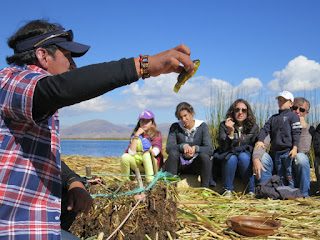This morning brought us relief from the altitude. Thomas felt better and I was altitude symptom free. We had a quick bite to eat at Suites Antonio before a mini bus picked us up to take us to the port. We were about to embark on a 2 day, one night stay on Amantani Island. We were "adopted" by a local family selected by the guide operation. We were able to see how they live, eat, and celebrate. The experience was relaxing and intriguing. As you will see, Lake Titicaca is spectacular!
Construction going on outside our hostel. Suites Antonio is really nice. To call it a hostel is a bit misleading. We are in a three bedroom private room that is really nice and clean.
Katherine and Thomas boarding the slow boat that took us out to the islands.
We started off through a canal cut between the reeds.
Looking back towards Puno.
One of the many floating reed villages we saw along the way.
Our guide Rodger showing the native fish from Lake Titicaca. In the 1930's trout and kingfish were introduced and have been eating the native fish. The locals eat everything, as we soon saw.
Rodger showing the edible part of the cane.
We stopped on one of the Uros floating islands and were given a tutorial of how the islands are built. This guy in the photo above is giving the demonstration in his local language called Aymara. Rodger then translated to Spanish and English.
We took a short ride on a reed boat while these children sang "Row, Row" in many different languages. Notice how their cheeks are burned from the 12,500 ft elevation with no sun protection.
On the reed island this is how the kitchen looks.
We then made it to Amantani Island. The picture above shows the location where we met our new Mamas and Papas.
Our accommodations were stellar. Norma and Cecil seemed to be staying in one room with their 2 children while guests took the other two rooms. This must be something they do when tourists come to stay. Our rooms looked like the children sleep in them normally. The island has no electricity, but our house had some solar power. There was also an outhouse with a bucket of water to flush. Our "mama," Norma, cooked us 3 stellar meals over an open fire. The people of Armantani Island do not eat any meat, so our meals were consisted of quinoa and other grains, different potatoes, beans, a small amount of other vegetables, and tea. The people of this island speak Quechua, and some Spanish. We communicated with our host family with our minimal Spanish, but everything worked out well.
This is the view from our bedroom looking towards Lake Titicaca. Bolivia is off in the distance.
Thomas and I admiring the view. Notice the terracing in the background.
Corn out for drying.
We all bought a few items Norma had for sale. Everything was handmade by Norma. She was very proud and kept telling us that it was all her work.
After a lunch of quinoa soup and various potatoes and beans, we met up with our group to hike to the Inca temple. As we hiked, our new mamas waited for us spinning wool. They are wearing the traditional attire for the women of the island. Tomorrow, we will travel to another island called Taquile and see another style of traditional dress.
This is Rodger pointing out the significance of the Inca Cross. At night, we could clearly see the constellations with the high altitude and lack of city lights.
Rodger's final drawing.
Sunset on Amantani Island.
Hiking back for dinner.
Thomas helping Natalie with her St. John's Day celebration performance. She has to recite this poem in front a big group and is really nervous, but knows that she has to practice.
Norma dressed Katherine in traditional garb for the dance party.
My outfit was much easier to don. There is not much to a poncho.
We hiked up to the dance hall and were entertained by local musicians. We mostly did large group circle dances that start small and develop into huge groups.
We were all tired and went home and crashed! What a day!





























No comments:
Post a Comment